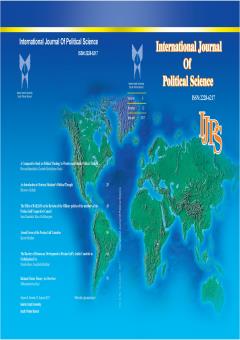Analysis of the Political Behavior of the Working Class in the Islamic Republic of Iran
Subject Areas :
Sadegh Akhtari Far
1
![]() ,
Mohammad Taheri Khonakdari
2
*
,
Faramarz Mirzazadeh3
3
,
Mohammad Taheri Khonakdari
2
*
,
Faramarz Mirzazadeh3
3
1 - Department of Political Science, South Tehran Branch, Islamic Azad University, Tehran, Iran
2 - Department of Political Science, Ilam Branch, Islamic Azad University, Ilam, Iran
3 - Department of Political Science, South Tehran Branch, Islamic Azad University, Tehran, Iran
Keywords: Political behavior, working class, labor actions, Islamic Republic of Iran,
Abstract :
The working class in contemporary Iran has faced many problems and limitations in the polit-ical sphere for various reasons, including absolute authoritarian rule and the absence of politi-cal openness. Although from 1941 through 1953, like many other sectors of civil society, the working class also found a suitable breathing space, after the coup of August 19, 1953, the labor movement was once again suppressed. During the victory of the Islamic Revolution, the working class played a significant role in overthrowing the Pahlavi regime by participating in widespread and paralyzing strikes. It contributed greatly to the establishment and consolida-tion of the Islamic system. The present research aims to understand the interactions and polit-ical behavior of the working class in the Islamic Republic of Iran. Thus, the question arises as to what behavior the workers exhibited within the framework of the Islamic Republic system. The research hypothesis is that in recent decades, Iranian workers, influenced by various fac-tors, have tended towards legal political participation and did not have revolutionary and anti-system tendencies contrary to Marxist-Leninist ideology. In this study, we will examine the subject using a descriptive-analytical method and a historical approach.
Abrahamian, Yervand. (2006). Articles in the Sociology of Iranian Politics. Translated by Soheila Torabi Farsani, Tehran: Pardis Danesh.
Abrahamian, Yervand. (2006). Iran Between Two Revolutions. Translated by Ahmad Gol Mohammadi and Mo-hammad Ebrahim Fattahi, Tehran: Nashr-e Ney.
Ahmadi Haji Kolahi, Hamid. (2008). Left Stream Sociology in Iran. Tehran: Islamic Culture and Thought Re-search Institute.
Bashiriyeh, Hossein. (2004). Political Soci-ology of the Working Class and La-bor Movements in Iran. Tehran: In-stitute of Higher Education for La-bor.
Bashiriyeh, Hossein. (2006). Political Soci-ology: The Role of Social Forces in Political Life. Tehran: Nashr-e Ney.
Bashiriyeh, Hossein. (2015). Introduction to the Political Sociology of Iran. Teh-ran: Negah-e Moaser.
Bayat, Asef. (2022). Workers and the 1957 Revolution. Translated by Moham-mad Darkash, Tehran: Akhtar Pub-lishing.
Behdad, Sohrab. Narimani, Farhad. (2008). Class and Labor in Iran. Translated by Mahmoud Motahed. Tehran: Agah Publications.
Habibzadeh, Afshin. (2008). Political Partic-ipation of the Working Class in Iran. Tehran: Kavir Publications.
Hafezian, Fatemeh. (2001). Labor Organiza-tions and Employers in Iran. Tehran: Andisheh Bartar.
Kheyrollahi, Alireza. (2018). Classless Workers: The Power of Workers' Leadership in Iran After the Revolu-tion. Tehran: Agah Publishing.
Labor and Social Security Institute. (1971). History and Conditions of Labor in Iran from Ancient Times to Present, Journal No. 2, Labor and Social Se-curity Institute, Tehran, October 1971.
Lajevardi, Habib. (1990). Workers' Unions and Self-sufficiency in Iran. Trans-lated by Ziaeddin Sadeghi. Tehran: Nashr-e Now.
Miles, Steven. (2022). Social Foundations of Consumerism. Translated by Ferdin Aliakhah. Tehran: Ehsan Thought.
Mohseni, Maryam. (2019). The Effects of Economic Adjustment Plan on the Situation of Iranian Workers. Devel-opment Culture: Issue 34-35.
Smelser, Neil. (2003). Collective Behavior Theory, translated by Reza Dezhkam. Tehran: Office of Political and International Studies, Ministry of Foreign Affairs.

